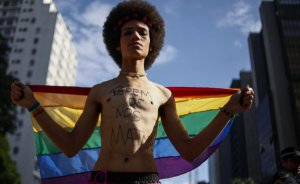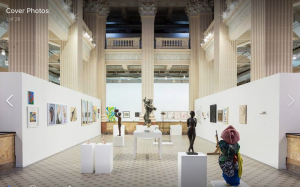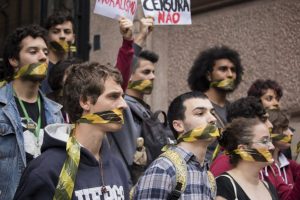
Brazilian man with the words “stop killing us” written across his chest. Photo by Miguel Schincariol
Today, Brazil is seeing a steep increase in violence towards the LGBT community. With the rise of Brazilian Evangelical representation in Congress, anti-LGBT sentiments have transcended politics and have found their way to the streets. According to The Guardian, last year 445 Brazilians of the LGBT community were murdered, a 30% increase from 2016. This strong hatred towards the LGBT community can be linked to the ultra-conservative evangelical leaders in Brazil. Brazilian politicians often associate to the LGBT community with the devil. The Guardian article says that often times, these same politicians equate these people with animals. In September of 2017, a judge approved conversion therapy after a gay art exhibit had been removed by the government. Discrimination towards people with regards to their sexual orientation and gender is not illegal, and justice for people of the LGBT community is rarely ever restored.

Crosses that represent LGBT victims in Brazil. Photo by Elza Fiuza
Unfortunately, the rise of traditional conservatism and evangelicalism is not slowing down. In 2016, 54% identified as traditionally conservative up from 49% in 2010 according to an article by The Atlantic. Anthropologists link this rise in conservative sentiments to the increasing fear of violence in Brazil. According to the Atlantic, Brazilians are favoring capital punishment, life without parole, and lowering the age of juveniles to be tried as adults. People have turned to a stricter religion and the church for help. This shift towards the church has increased the number of evangelicals in Brazil from 6.6% in 1980 to 22.2% in 2010. In a violent war torn country, the people are confiding in Law and Order and punishment for those who do not obey traditional practices, leaving the LGBT community at the mercy of non-evangelical politicians.

Jair Messias Bolsonaro praying at a press conference. Photo by Apu Gomes.
Its important to talk about religion and those who use it as a means of “othering” people. Jair Messias Bolsonaro is one of the most conservative politicians in the larger Brazilian political arena. He has often made extremely homophobic remarks, saying he would rather have a “dead son than a gay son.” Despite backlash for his disgusting remarks, he has declared a run for the presidency in 2018. This related to class themes that talk about the “other” people. Since the Portuguese arrived to Brazil, the social construction of “othering” different people has only caused harm to those deemed as other. In Brazil, as homophobic sentiments are on the rise, a once LGBT welcoming Brazil has turned in the LGBT murder capital of the world. Religion is also associated with this theme of “othering.” Christianity and its influence on these politicians have played a key role in demonizing the LGBT community in Brazil again.
External Links to the articles used:
The Guardian – https://www.theguardian.com/world/2018/jan/22/brazil-lgbt-violence-deaths-all-time-high-new-research
The Atlantic – https://www.theatlantic.com/international/archive/2018/01/the-evangelical-takeover-of-brazilian-politics/551423/
“Crosses” photo – http://www.humanosphere.org/human-rights/2017/05/un-calls-for-inquiry-into-anti-trans-violence-in-el-salvador/
“Stop Killing Us” photo – http://www.newsweek.com/pride-around-world-sao-paulo-lgbt-community-hosts-bigger-pride-parade-san-628004








